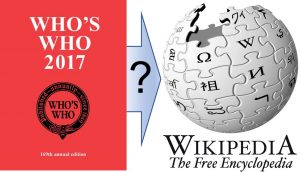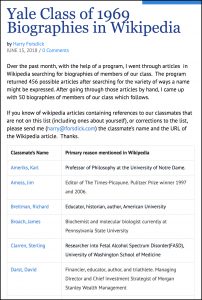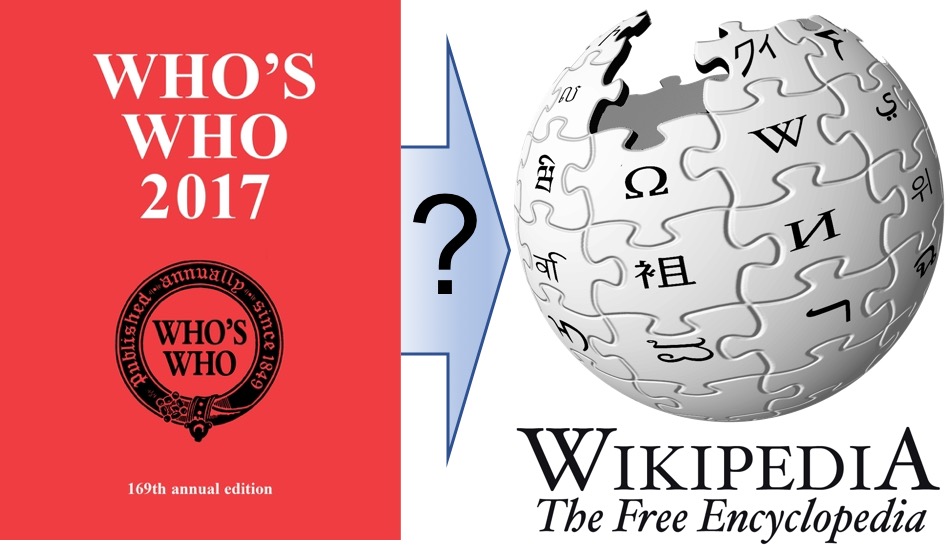Is Wikipedia The New Who’s Who?
 Has Wikipedia become the 21st-century version of Who’s Who, and if so, how many members of the Class are profiled there?
Has Wikipedia become the 21st-century version of Who’s Who, and if so, how many members of the Class are profiled there?
What does having a Wikipedia biographical profile published mean anyway? Is it a fair indicator of “success?”
Are classmates listed there representative of the broader Class? We were curious, so I investigated.
Let’s cut to the chase: As of today, there are currently 864,901 biographies of living people in Wikipedia, of which fifty (50) relate to members of the Yale Class of 1969.
For those who just want to see the list of classmates I found on Wikipedia, just click through.
Others may want to read further … to see how Wikipedia works, why certain groups are over-represented and what YOU can do about your own entry.
.

Wikipedia ≠ Success
First, being in Wikipedia does not equal “success.” Clearly that’s true when very successful people aren’t included. It took me just 20 seconds to find two examples of Classmates who are “successful” by any conventional standard and who don’t appear in Wikipedia. See, e.g., Lee Goldman (Chief Executive of Columbia University Medical Center) and Bobby Haas (successful investor, National Geographic photographer and philanthropist). I’m sure there are dozens more.
That’s not a broad condemnation: It’s probably impossible to create a single encyclopedia of successful people — even Who’s Who was biased because people listed were solicited for payment (and those who didn’t pay could be deleted). “Success” is simply too elusive a concept not to have false negatives or false positives.
Why are so many interesting and successful people not in Wikipedia? As I looked through the biographies of classmates who are in Wikipedia, I noticed that the distribution of professions in Wikipedia is not at all representative. But, I’m getting ahead of myself.
How Was The List of 69ers in Wikipedia Harvested?
First, I worked with a friend to write a program that took the First, Middle and Last names of the 1056 members of our class and searched Wikipedia for “profile” articles (Wikipedia’s term for biography) containing those names. To be complete, we used many different forms of a person’s name: Harry Clarke Forsdick, Harry C. Forsdick, Harry Forsdick, H. Forsdick, H. C. Forsdick, etc. The program identified 456 Wikipedia articles that matched names of people in our class.
The next job was to look at each Wikipedia article to see if related to a Classmate or to someone else. It took me about a month of sporadic work to discover the 50 articles that were about people in our class, using heuristics like birthdates in the 40’s and a mention of Yale in the bio. (Not all bios mention graduation college, so in some cases, I needed to match career highlights in Wikipedia with 25th Reunion Essays and mentions in Class Notes!)
In the end, I found 50 members of our class in Wikipedia. By the way, if I missed an article in Wikipedia about you or another Classmate, please let me know by email, harry@forsdick.com.
Why Are Some People In and Others Not?
While manually finding biographies, I started to notice the pattern of who appeared and who was missing. Here is a list, by profession, of the 50 Yale Class of 1969 Wikipedia entries:
- Academic/Research (18)
- Government (13)
- Entertainment (4)
- Sports (4)
- Business (3)
- Polymorph (3)
- Writer/Author (2)
- Healthcare (1)
- Journalism (1)
- Composer (1)
So, fully one-third of our Wikipedians are academics! Twenty-five percent is from “government,” and most of the rest are in media, sports and entertainment. Only three entries are “business,” which includes finance. Why is this?
Well, Wikipedia has strict rules against self-promotion, so it’s nearly impossible to just write your own biography. You can team up with an “authoritative” source (in Wikipedia’s eyes), who can do it for you, so long as they follow the format and conventions that Wikipedia requires, specifically, a “neutral” tone, footnoted claims, multiple sources and no puffery. The Wikipedia editors are very demanding, especially on new profiles being entered.
Governments, universities and media outlets are, by definition, “authoritative,” and PR officials in those organizations know how to write Wikipedia bios. Moreover, they have good reason to make the effort, as increased public profile for essentially public people is almost always valuable. (And if you think that being a university professor isn’t political, well, … just ask any Classmate from academia!) So, Classmates in government, academia and media are more likely to have Wikipedia entries that those of us in the private sector.
That’s not to say that YOU can’t get your own Wikipedia entry. There are also many services that will take care of everything needed to get your biography on Wikipedia. Just search Google for “Wikipedia profile writing service.” Provided you have something substantial, they know how to get you listed.
Let’s Get More!
After looking through a lot of Wikipedia biographies, I’ve decided to seek a Wikipedia entry for myself. While my career hasn’t been wildly spectacular, I certainly have been [much] more successful than many others profiled on Wikipedia.
Frankly, I think getting an encyclopedia-type entry about me into the public record will be a cool, additional item of legacy that might be a source of pride or inspiration to a great-grandchild or thereafter. I think it’s worth the effort now to get this placed.
As a webmaster, I got to see the Personal Essays as they came in. Wow! We really are a remarkable bunch. Even the people who reported some major setbacks and regrets had admirable, interesting, and accomplished chapters of their lives. Some of those may not be noteworthy enough for a typical Wikipedia bio, but I’m confident that the honors and achievements that many Classmates can honestly claim would pass muster with Wikipedia’s editors.
Why should you consider doing this? Well, it’s not for the ego trip. And you’ll need to overcome any disabling habits like introversion, fear of rejection, false humility or imposter syndrome. The reality is that we are now in that part of our lives identified by Erik Erickson (remember him? Childhood and Society?) as dealing with generativity/stagnation or ego integrity/despair. Whether you are actively involved in nurturing the next generation (of children or of proteges) or you are consolidating the meanings of your life into a more coherent whole, summarizing your life to date and reifying it into a Wikipedia entry seems like a useful, beneficial thing to do for your descendants.
I encourage you to do it!
Wikipedia collects in one location, a large number of uniformly written, searchable biographies. Some people are critical of the grassroots, crowd-sourced nature of Wikipedia, and there have been some spammy articles published (and removed!) on Wikipedia. Those are the exceptions that prove the rule: Most of the articles are factual and accurate — at least as good if not better than the material published in commercial publications. And it has proved to be a resiliant platform for real biographies. They are likely to hold up over time and be a great way for you to present the highlights of your life so far to those deep into your family’s future.

